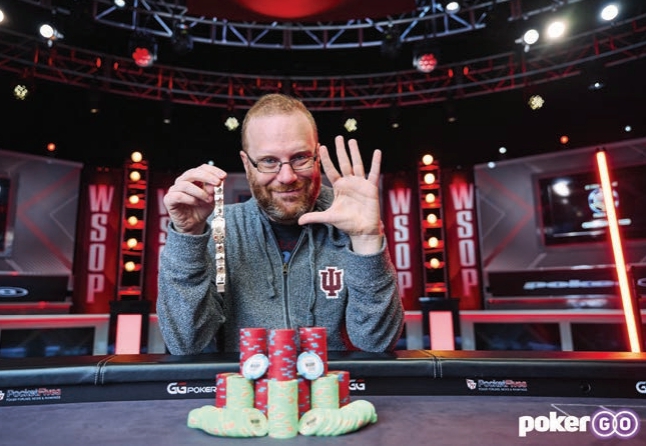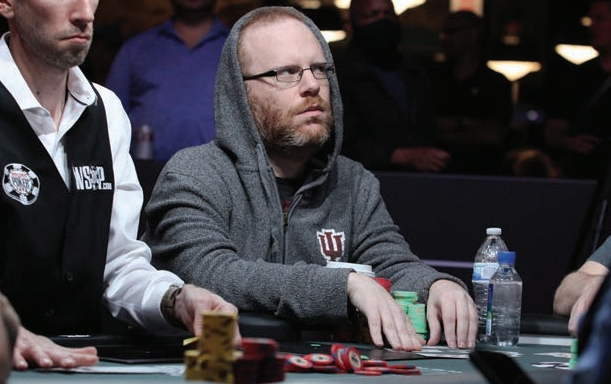






Five-Time Bracelet Winner Adam Friedman Talks Studby Bernard Lee | Published: Mar 08, 2023 |
|
|
 During these series of strategy columns, I will be interviewing 2022 WSOP winners. These champions will provide observations, tips, and strategies for you, the readers of Card Player, about the specific poker game in which they captured their bracelet.
During these series of strategy columns, I will be interviewing 2022 WSOP winners. These champions will provide observations, tips, and strategies for you, the readers of Card Player, about the specific poker game in which they captured their bracelet.
The Event: $10,000 Seven Card Stud Championship
The Winner: Adam Friedman
In 2021, this Gahanna, Ohio resident set an unprecedented record at the WSOP. Adam Friedman captured his third $10,000 Dealer’s Choice Championship in a row! Friedman won the event in 2018, 2019 and 2021 (Note: The event was not offered in 2020 due to the COVID-19 pandemic).
Fellow poker professional, four-time bracelet winner, and good friend Anthony Zinno stated that Friedman’s accomplishment was one of the best he has ever seen in poker.
The 40-year-old Friedman went on to capture his fifth bracelet the next year in the $10,000 Seven Card Stud Championship, along with $248,254 to give him nearly $4 million for his career. (His first bracelet came in the 2012 $5,000 stud eight-or-better event.)
His latest title had special meaning for the Indiana University graduate since it came in the game that he grinded at the Commerce Casino in Los Angeles for years.
I spoke with Adam after his victory for my radio show (You can watch my interview on my YouTube channel BernardLeePoker or listen on your favorite podcast app) and he gave some advice about playing seven card stud tournaments.
Bernard: Last year, you had the opportunity to do something that had never been done by three-peating the same event. In your case, it had to be in one of, if not the hardest event in poker, the $10,000 Dealer’s Choice Championship. Did you feel any pressure heading into the event last year?
Adam: It was funny. Last year, I put an enormous amount of pressure on myself to three-peat since it had never been done. I put an unjust amount of pressure on myself as people would always remember the accomplishment. But going into this year, I put zero pressure on myself and I was just going to have fun. When I was eliminated [from the Dealer’s Choice], there was actually a lot of relief that it was over.
Bernard: You had said that winning your fifth bracelet in stud was very meaningful to you. Why?
Adam: I was very happy to win the stud championship, which meant a lot to me personally. It was the game I grinded on forever out in Los Angeles at the Commerce (Casino). The game was going on for decades, but unfortunately is now dead. RIP. But stud is the game I put in a lot of my poker years into grinding and working.
Ironically, it is a tournament that I hadn’t had much success in at the WSOP. Even this time, I didn’t start out great, but I had a rush of cards for three and half levels that I’ve never seen before and I went on to win the bracelet.
Bernard: What would be the first advice you would give someone just starting out with stud?
Adam: Keep it really simple. You want to play tight ranges, so start with big pairs, live three-flush cards, and live three-straights – the higher the better. Don’t play lots of hands with ‘possibilities’ as they will just get you into trouble. Overall, in tournaments, it is better for you to be more cautious. With regards to betting, saving bets is much more important than making bets.
 Bernard: Speaking of bets, the structure is a little different in stud, where the small bet is on the third street, where the big bet is on fifth, sixth, and seventh street. Are there any specific strategies when it comes to these streets?
Bernard: Speaking of bets, the structure is a little different in stud, where the small bet is on the third street, where the big bet is on fifth, sixth, and seventh street. Are there any specific strategies when it comes to these streets?
Adam: The two most critical decisions in stud are on third street, when you have to decide whether to play your starting hand, and fifth street, when you have to make the first big bet. Fifth street is where the real money starts to get in, so you better be sure where you are in the hand.
Also, the one big difference in stud is that you have three streets with a big bet, whereas hold’em and Omaha only have two big bets on the turn and river. You are going to lose more money in stud games and mistakes compound this issue.
Bernard: Are there any other aspects to the game that players should focus on in stud?
Adam: Another critical skill is observation, not just the cards but also the players. Players who play predominantly hold’em aren’t used to observing other players’ cards because they don’t have to.
It’s extremely important to observe the up cards. You need to understand what cards will help you and most importantly, if they are live. If you have three to the straight, like J-10-9, you must recognize if the two immediate cards in queens and eights are live.
Another example is if you have a premium hand with three spades, but there are three other spades that are up cards. Now, the hand becomes less appealing and you can easily fold, where many players don’t notice the other spades and still raise and call the entire way. You are better off folding the hand and waiting for a better spot.
Bernard: Let’s talk about your opponents and how to observe them.
Adam: Just like with any game in poker, you really have to understand your opponent’s tendencies. In stud, some players are very sticky and will call you down with just one pair. You have to know who those players are and may have to just give up on fourth or fifth street since you just can’t bluff them.
Bernard: Some people think the game is easy since it is high only and many cards are face up, but there are a lot of nuances to the game, right?
Adam: To me, it’s a game about representation by misrepresentation. Sometimes you are representing one hand, but in reality, you have something else. By doing this, you can manipulate your opponent and end up getting calls or even folds to win the hand.
Don’t get me wrong, stud can be a very frustrating game but I really feel it’s a beautiful game. I think people would really enjoy playing it if they gave it some time and effort.
The one thing about stud is that you got to put the hours in to see the nuances. Whatever I say will not have much meaning if you haven’t played enough hands. Even if you are playing at a low-stakes cash game, you will see certain situations that you will only experience if you play.
Also, make sure to watch the player that you perceive is the best at your table. You can potentially learn different moves or strategies that you didn’t consider before.
Bernard: You turned 40 this year, which makes you eligible for the Poker Hall of Fame. How important is that to you?
Adam: It would be nice to be in the Hall of Fame, but it won’t be confirming of anything that I have accomplished in poker. I think I know how my peers feel about my game. With the amount of upcoming eligible great players and the inevitable backlog that’s about to occur since only one player is allowed in a year, I’m not going to be upset if I don’t get in.
Bernard: Congratulations again on your fifth WSOP bracelet, and I’m sure there will be more to come.
Bernard Lee broke into the poker world after a deep run in the 2005 WSOP main event. He has two WSOP Circuit rings, and is an author, having written for Card Player, the Boston Herald, Metrowest Daily News, and ESPN, where he was a host of the show The Inside Deal. His radio show and podcast, The Bernard Lee Poker Show, recently celebrated its 15th anniversary, and his latest book, Poker Satellite Success: Turn Affordable Buy-Ins Into Shots At Winning Millions, is now available on Amazon as well as D&B Publishing. Follow him on Twitter @BernardLeePoker or visit his website at BernardLeePoker.com or YouTube channel at Youtube.com/BernardLeePoker.
Features
Tournaments
Strategy
Commentary & Analysis